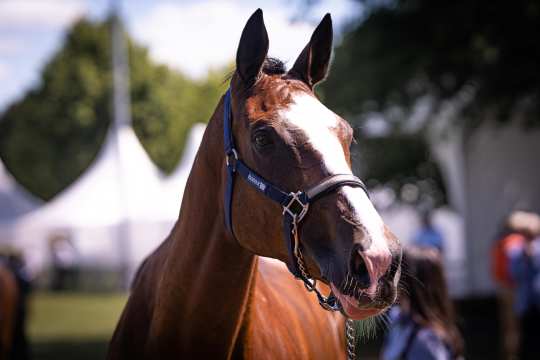22.05.2024
CHIO Aachen Scientist Circle
Scientific monitoring of the well-being of the horse to be extended
A chance encounter at an event got the ball rolling: Birgit Rosenberg, Member of the Managing Board of the Aachen-Laurensberger Rennverein (ALRV), and Prof. Dr. Dirk Winter started talking about the topic of the scientific examination of animal welfare. Several telephone calls and a few months later, a significant project was born: the CHIO Aachen Scientist Circle.
This alliance comprises of eight voluntary scientists and horse experts from Germany, Belgium and Switzerland and occupies itself with the well-being of sport horses. The question posed, which was already addressed during CHIO Aachen 2023, is: How do the show horses feel during their stay at the CHIO Aachen compared to in their stables at home? The aim of the survey is to collect well-founded data on the status quo and find ways of making the horses’ stay more pleasant in future, so that they are offered the best possible conditions. On board last year: Four international show horses, which were monitored round-the-clock using AI-supported camera technology and whose stress levels were determined among others by measuring the faecal cortisol level.
The initial evaluations leave the scientists optimistic. “The observation has led to the positive conclusion that although the horses spend more time in the stable during the show in Aachen compared to when at home, they were kept occupied and exercised a lot,” explained Prof. Winter, Academic Dean Equine Management at the Nürtingen-Geislingen University of Applied Science. Since the scientists of the CHIO Aachen Scientist Circle feel that the topic is very important and the examinations are to be further expanded at the coming shows, they are being assisted meanwhile by the PhD student, Leonie Krüger. Among others, in the course of her doctorate she will be responsible for evaluating the data collected so far. The cortisol samples taken during the show in 2023 comprised of samples from four days at the home yard, during the transportation to Aachen, while training and competing on-site, during the return transport and the following three days at home.
Leonie Krüger reported on the evaluation of the samples from the pilot survey: “Cortisol is produced during physical and psychological stress, which is why the level increased on the competition days. That is totally logical. The curve of the rider would probably be similar. The further cortisol levels that were taken while the horses were stabled in Aachen were pretty low.” The scientist interpreted these initial results as follows: “The transportation and the training in Aachen apparently didn’t have a great effect in terms of the stress level. And we were able to determine that once home the horses returned to the pre-competition level again very soon after the show.”
Pilot survey becomes an experimental design for the coming years
Krüger and Winter warn against an overevaluation or misinterpretation of the initial findings. “Science takes time. We cannot make any well-founded, definitive statements yet,” the PhD student emphasised. Winter added, “We now have an initial evaluation, but we can’t come to any deductions or general conclusions based on four horses.” To change this a much higher number of horses will take part in the survey during the CHIO Aachen 2024 already – at least twelve.
“We are looking ahead to the future. We will develop the experimental design for the next years based on the pilot survey. It has to be expedient and cover the right parameters so that we can come to really scientifically-based conclusions about the well-being of horses while stabled at shows,” explained Leonie Krüger. Among others, the monitoring per camera is to be enhanced by a direct observation of the animals. Beyond this the essential factors of the air in the stable are to be determined by sensors. It was noted that after monitoring around 30 to 40 horses within an overall period of three years, it will then be possible to come to a sound conclusion. However, the scientists are not expecting a final result in the classic sense. “There will always be new factors that influence the animals’ well-being, which we will have to examine,” they agreed. That is also why the CHIO Aachen Scientist Circle will be committed to the theme animal welfare long-term.
To ensure that the horses are monitored as well as possible in the future, Prof. Dr. Winter can also imagine having all the stables in Aachen fitted with cameras. “This would enable the organisers and the riders to demonstrate for instance that the living conditions of the horses are closely monitored.” Further possibilities of how additional animal welfare aspects can be monitored are being examined. “We are currently occupying ourselves with the application of further innovative, technical methods,” Winter revealed.
The CHIO Aachen could thus possibly also serve as a role model for other shows, even if the conditions for the horses do vary everywhere. Dirk Winter is convinced: “Aachen is the most important show worldwide. Other organisers could orientate themselves on the best possible standards we are developing here in the future.”
You can find all information about the Scientist Circle here.
#chioaachen
CHIO Aachen website

representative image
CHIO Aachen 2025: Pop star Alvaro Soler is the top musical act at the Opening Ceremony on July 1stCHIO Aachen 2025: Submit photos for "Silver Camera" nowCHIO Aachen 2025: Submit entries for “The Silver Horse” nowDressage legend Isabell Werth on the historic Olympic triumph in Paris, doping and a disgusting shock callUBS new partner of the CHIO AachenDressage legend Isabell Werth shares many personal memories in the CHIO Aachen PodcastThe secondary ticket market for the CHIO Aachen 2025 is openDue to high demand: Additional date for “Horse & Symphony” on June 27th, 2025Record Olympic Champion Michael Jung in a rare chatty mood in the CHIO Aachen Podcast




